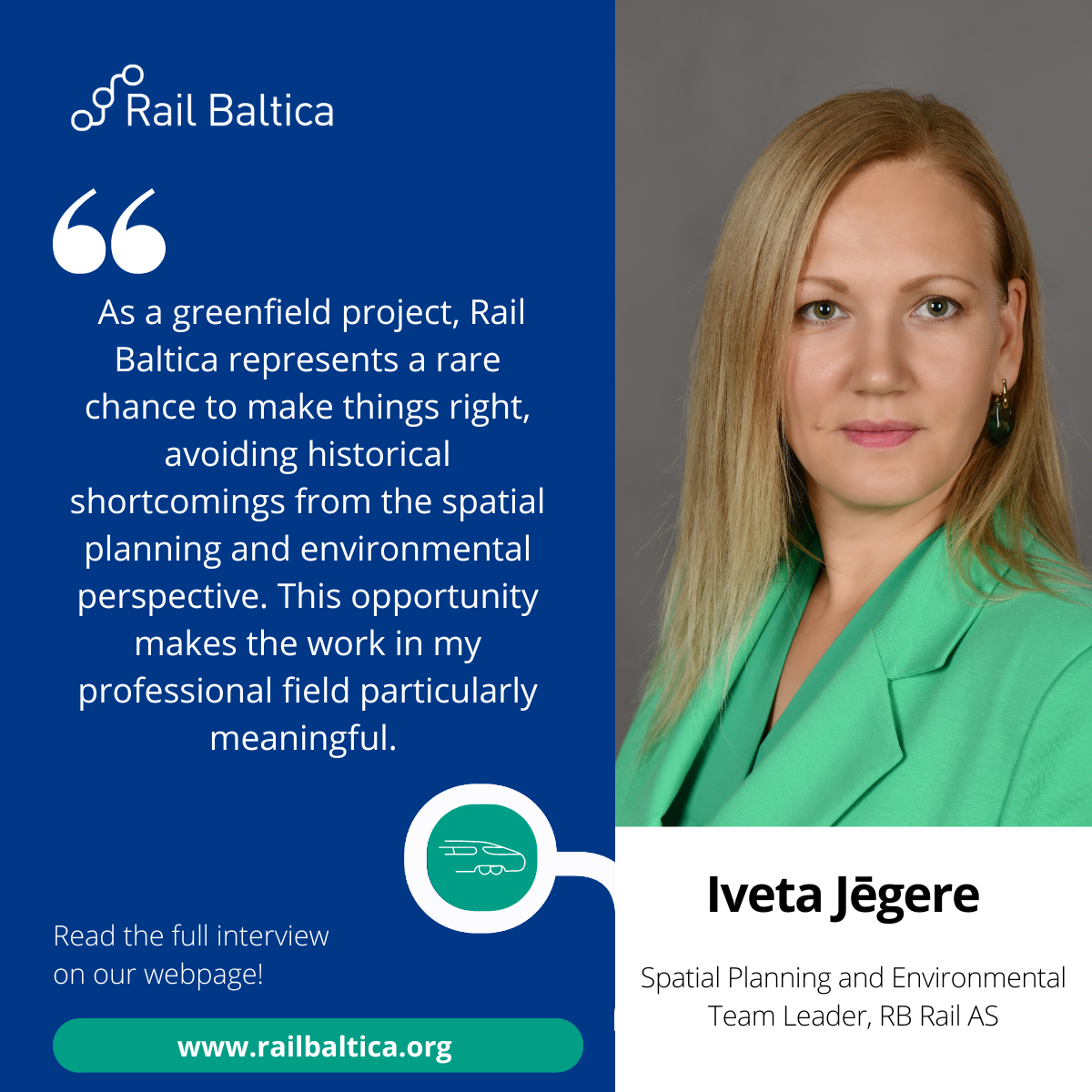Rail Baltica is a railway infrastructure megaproject that spans across three countries. The depth of skills and expertise required to successfully execute a greenfield project of this caliber is extensive and would not be possible without our diverse team of professionals.
In our series “Rail Baltica: The People Behind the Vision”, we will introduce you to some of our team members. These individuals are the driving force advancing the Rail Baltica project with their professionalism, dedication, and passion for this project.
 Iveta Jēgere, Spatial Planning and Environmental Team Leader at RB Rail AS.
Iveta Jēgere, Spatial Planning and Environmental Team Leader at RB Rail AS.
When did you join the Rail Baltica project and what inspired you to become a part of the team?
I joined this company 2 years ago, but this is my second encounter with the project. Back in 2016 I was one of experts involved in the procedures for setting Rail Baltica route in Latvia. Then, in 2021, the project reappeared in my professional sphere. Some life choices, whether personal or professional, can happen with a stunning sense of rightness, and becoming part of the project felt exactly like that. Like many of my colleagues, I had a strong pull to the grand scale and was captivated by the level of proficiency in Rail Baltica team, but, sure, I also understood there would be a massive number of things to learn and overwhelming challenges along the way. It was encouraging to know that I would have the support and trust needed to deliver results and that I have the knowledge the project needs and could benefit from. Such factors can serve as good motivators.
What is your role in the project?
I am the team leader of a fantastic group of environmental experts, and together we help project implementors to bring Rail Baltica to life from an environmental perspective. For an infrastructure project of this magnitude this, firstly, means various procedures and environmental studies in the planning and design phase, to determine the acceptable level of impact on the environment and measures for mitigation. Our role is to provide technical support to project management throughout these procedures, ensuring that such measures are identified and implemented. Secondly, as the project gradually evolves, this means setting up and offering a system for transparent and consistent environmental management during construction and operation. Thirdly, being part of environmental team in Rail Baltica project means being involved in the overall strategy and challenges of the Rail Baltica project. We are building infrastructure with a design life of up to 100 years in a changing legislative environment that aims towards the ambitions of the Green Deal, preservation of biodiversity and a low carbon economy. This means we must also make balanced decisions that are fit for the future, even though such decisions must be made with the human mindset, level of knowledge, and available resources of today.
How has your role evolved since you first joined the Rail Baltica project, and what have you learned along the way?
I think that the role of environmental management evolves continuously, and it grows together with the project. A joke was once made by a colleague that environmentalists should not be left alone in a room unwatched, otherwise you don’t know what they can come up with. This joke is indeed brilliant, as in some way, it is also true. Environmental protection is a horizontal discipline, it is neither a sweet side hobby, nor a movement of radicals. It is part of management with technical, strategical, financial, and reputational impacts, and every second or third decision made can also carry an environmental risk. Without an environmental expert in the room, you may not even notice that the risk is there. That is why environmental protection should be exactly in the same room and on the same page with other disciplines. I am glad when it is recognized, and I have learnt how this not only boosts common competency, but also brings new priorities to the environmental agenda.
What does the Rail Baltica project mean to you?
As a greenfield project Rail Baltica offers a rare chance to make things right, avoiding historical shortcomings from the spatial planning and environmental perspective. This opportunity makes the work in my professional field particularly meaningful.
